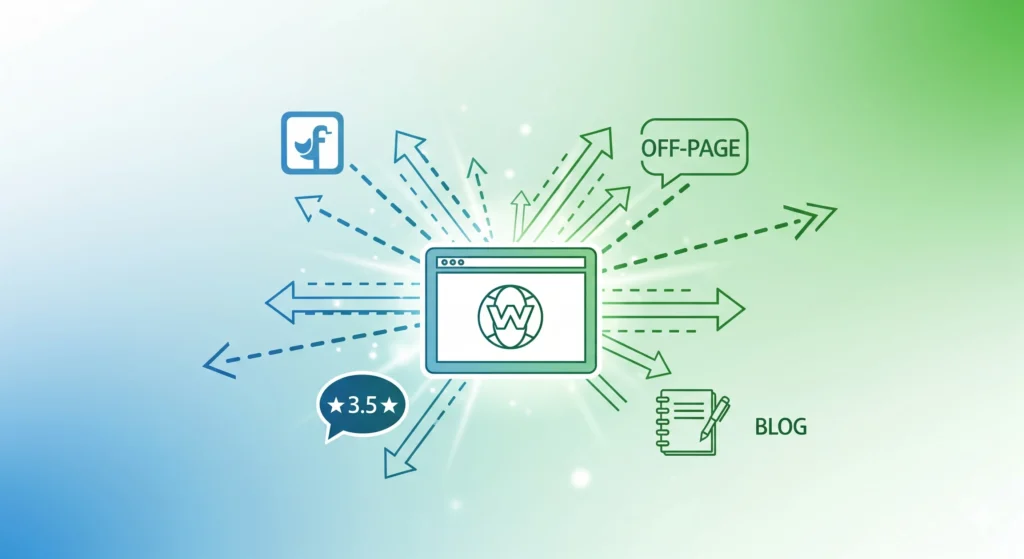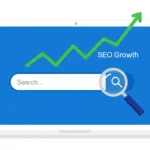When people hear “SEO,” they often think of keywords and content. That’s the on-page side of things, where you tweak and polish your own website. But ranking high on Google isn’t just about what you do on your site. It’s also about how the rest of the internet sees you. That’s where off-page SEO comes in.
If on-page SEO is like dressing up your store nicely, off-page SEO is word of mouth. It’s people recommending your shop, linking to it, and talking about it online. And in Google’s eyes, those signals of trust are just as important—sometimes even more—than what’s actually on your site.
What is Off-Page SEO, Really?
At its core, off-page SEO is everything that happens outside your website but affects your rankings. The biggest part of that is backlinks—when other sites link to yours. But it’s not just about links anymore. Google also looks at things like:
-
Brand mentions (even without a link)
-
Social media signals
-
Online reviews
-
PR coverage
-
Guest posting, podcasts, interviews
-
Directory listings and citations
Basically, anything that proves your website is credible, popular, and trustworthy.
Why Off-Page SEO Matters
Google wants to rank the most reliable and authoritative pages. Let’s say two websites publish the same high-quality article about “best running shoes.” If one of those websites has hundreds of links from big names like Nike, Adidas, or Runner’s World, and the other site has zero outside mentions, guess which one Google will trust more?
That’s why off-page SEO is often described as building authority. You’re showing Google that the wider internet values your content.
The Backbone: Backlinks
We can’t talk about off-page SEO without digging into backlinks. Not all links are created equal, though.
-
Quality beats quantity: One backlink from The Times of India or Forbes is worth more than 100 random blog comments.
-
Relevance matters: If your site is about digital marketing, a link from Moz or HubSpot will help more than a link from a gardening blog.
-
Anchor text: The clickable text of a link gives context. “Learn off-page SEO tips” is stronger than just “click here.”
A lot of people fall into the trap of chasing thousands of backlinks, often through shady link farms or cheap services. But Google’s algorithms are smarter now. Spammy links can hurt more than help.
Ways to Build Backlinks (Without Being Spammy)
1. Guest Posting
Still one of the most reliable strategies. Write an article for another site in your niche, add value, and link back to your own site naturally.
2. Broken Link Building
Find broken links on relevant websites (tools like Ahrefs or Semrush help). Reach out to the site owner and suggest replacing the dead link with your content.
3. Skyscraper Technique
Coined by Brian Dean: find a popular article in your niche, create a better and updated version, and then reach out to sites linking to the old one.
4. Digital PR
Get featured in news stories, press releases, podcasts, or interviews. These mentions often come with powerful links.
5. HARO (Help a Reporter Out)
Journalists look for expert quotes. If you provide input, they’ll cite you and link to your site.
6. Resource Pages & Directories
Many industries have “resource” lists or curated directories. A link from one of these can send both traffic and authority.
Beyond Links: Other Off-Page Signals
Off-page SEO isn’t only about backlinks anymore. Google looks at brand authority in broader ways.
Brand Mentions
Even if your name is mentioned without a hyperlink, Google can associate it with authority. So if your brand gets talked about in forums, social media, or articles, it helps.
Social Media Engagement
There’s debate about whether social signals directly affect rankings. But one thing’s clear: a blog post that goes viral on Twitter or Instagram gets more visibility, traffic, and natural backlinks. So, while likes and shares aren’t ranking factors themselves, they indirectly push SEO.
Online Reviews
For local SEO, reviews are huge. Google My Business reviews, Yelp, TripAdvisor, and industry-specific review sites all play a role. More positive reviews = higher trust.
Podcasts & Interviews
Podcasts are underrated for SEO. Many podcast sites publish transcripts and show notes with backlinks. Plus, they build your reputation as an expert.
Influencer Collaborations
Partnering with influencers in your niche can spark mentions, social buzz, and sometimes backlinks.
Local Off-Page SEO
If you run a business that depends on local customers, like a café, gym, or salon, local off-page SEO is just as important.
-
Google Business Profile: Claim and optimize it. Add your address, hours, photos, and posts.
-
Local Citations: Make sure your business info is consistent across platforms like Justdial, Sulekha, or Yelp.
-
Local Press: Get featured in neighborhood newspapers or blogs.
-
Customer Reviews: Actively encourage happy customers to leave Google reviews.
Google pays attention to how often and how positively your business is mentioned locally.
The Dark Side: Black Hat Off-Page SEO
Not all off-page strategies are clean. Some folks still try:
-
Buying backlinks in bulk
-
Spamming blog comments
-
Private blog networks (PBNs)
-
Fake reviews
These might give short-term boosts, but Google’s penalties are brutal. It can tank your site completely. Unless you’re running a throwaway project, it’s not worth the risk.
Tracking Off-Page SEO Success
How do you know if your off-page work is paying off? A few ways:
-
Domain Authority (DA) or Domain Rating (DR): Third-party metrics from Moz or Ahrefs. Not official, but a good indicator of link strength.
-
Referring Domains: The number of unique websites linking to you. More unique domains = better.
-
Traffic from Referral Sites: Google Analytics shows if people are coming from other sites that linked to you.
-
Brand Mentions: Use tools like Google Alerts or Brand24 to see where your name pops up.
-
Search Rankings: Ultimately, the goal is higher positions in SERPs.
Off-Page SEO vs On-Page SEO
They’re two sides of the same coin. On-page gets your site ready and optimized. Off-page gives it credibility and reach. You can’t do one without the other. Imagine polishing your store interior (on-page) but never telling anyone it exists (off-page).
Practical 30-Minute-a-Day Off-Page Routine
If you’re not an agency and don’t have hours to spare, here’s a realistic approach:
-
Mondays: Outreach – email 5–10 websites for guest posts or link swaps.
-
Tuesdays: Social push – share your content across social media, engage in niche forums.
-
Wednesdays: Find broken link opportunities.
-
Thursdays: Pitch for podcasts, HARO responses.
-
Fridays: Check analytics, measure referral traffic.
-
Weekends: Light work – respond to reviews, engage with community.
Small, consistent steps compound over months.
Wrapping Up
Off-page SEO is basically reputation management for your website. The internet is crowded, and Google’s job is to figure out which sites people trust the most. By building backlinks, generating brand mentions, engaging on social media, and earning reviews, you show both users and search engines that you’re worth paying attention to.
Think of it less as “tricking Google” and more as genuinely making your brand visible and respected in your niche. Do that consistently, and rankings naturally follow.



